Seven Eleven Stores
Vocabulary
| try | ground | Seven-Eleven (7-11) |
| coffin | arrange | previously |
| invite | grieve | disrespect |
| sob | prefer | consolation |
| feast | check (2) | attendees |
| heaps | cheer up | announce |
| roast | upscale | prodigious |
| gift | feast | following (2) |
| vase | jewelry | to no avail |
| pal | buddy | establishment |
| dine | sculpture | scrumptious |
| debt | tab (2) | pick up the tab |
| treat | exceed | it turned out |
| shut | broke (2) | buy/bought/bought |
| knock | assist | ultimately |
| slam | force (2) | bring/brought/brought |
| frugal | force (2) | convenience store |
| clerk | reassure | to frequent |
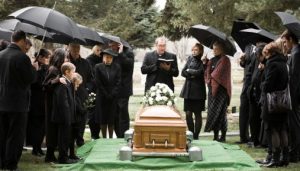
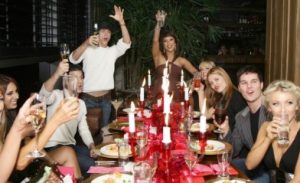

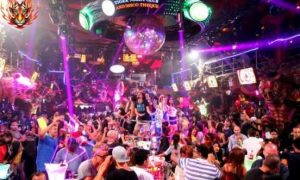
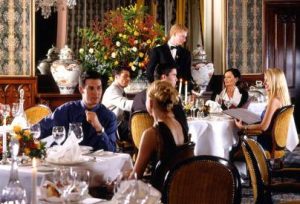
The Funeral
Ronald tried to force himself to cry — but simply couldn’t.
And so he and others stood watching in silence as his father’s coffin was lowered into the ground.
The Gateway Restaurant
After the funeral, as previously arranged, Ronald and a group of friends met at the Gateway Restaurant.
During the meal, servers brought heaps of roast beef, lobster and chicken, along with fine wine. A band with dancers entertained guests. The dinner lasted past midnight.
The French Restaurant
The next day, Ronald invited everyone to dinner at the Les Apotres de Pigalle Restaurant. The group was larger this time.
After having dined on filet mignon, bouillabaisse, quiche Lorraine and mousse au chocolat, Ronald announced to all the attendees, “I still feel saddened over my father’s death. Let’s have dinner again tomorrow to cheer up — this time at the Ibiza Night Club.”
And so they did.
Different Establishments
This went on night after night. Month after month. Ronald and all his pals would dine and party in different establishments — restaurants, clubs, bars and discos — throughout the city.
Moreover, Ronald would buy them gifts: vases, paintings, sculptures and gold and silver jewelry.
Whenever his friends asked Ronald about the check, he reassured them. “Don’t worry about it. My father was a very rich man. He left me with plenty of cash, so it’s no problem at all.”
By now, he had amassed a large following.
The Bill
Then one evening, after another scrumptious feast, the waitress returned with Ronald’s credit card. “Sorry, Sir. But it won’t let us accept a payment; your card is not working.”
“What!?! What are you talking about? Are you joking?” asked Ronald. But the waitress was sure.
Ronald took out and gave her his other credit cards . . . but none of them worked either.
He then asked his friends around all the dinner tables if they could help pick up the tab. “Oh, sorry, I’ve got to go now — I must get up early for work tomorrow,” said Jim, his best friend, and got up and left. Everyone else did the same.
In the end, Ronald gave his gold watch to the restaurant.
At The Bank
The following day, Ronald went to his bank. It turned out that he had exceeded his credit limit and was now thousands of dollars in debt. And he still had to pay off the mortgage for his new house.
Help
Ronald then began going to the homes of his friends, the ones he had treated all those days and nights in clubs, restaurants and discos, and whom he had bought presents, to ask for help.
But when he knocked on their doors, he often received no answer. When they did open up, they usually said they were broke as well, and couldn’t assist in any way.
Others, including Bob, his second best friend, replied, “Who are you? I don’t you who you are. We’ve never met before,” before slamming the door shut.
Liquidation
Ultimately, Ronald was forced to sell his house and one of his father’s two Seven-Eleven convenience stores, and move back with his mother.
With the proceeds from the sales, Ronald was able to pay off all his debts. He then began working at the remaining 7-11 store as a manager and clerk.
At this point, Ronald no longer frequented high-class restaurants, clubs and pubs. He stopped spending prodigiously. He became very frugal and careful with money, his habits and relationships.
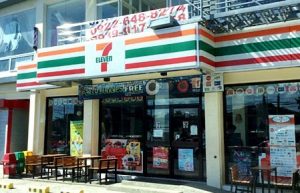
Questions
1. “Ronald tried to force himself to cry — but simply couldn’t.” What does this mean?
2. Ronald began having feasts and parties after his father passed away. True or false? Why did he do this?
3. Did they go to cafes and fast food restaurants?
4. At this time, Ronald had many friends. Is this right or wrong?
5. Did they stop feasting and partying because they got bored with that?
6. Afterwards, all of Ronald’s friends helped and supported him. Is this correct or incorrect? Was Ronald surprised and disappointed?
7. What happened in the end? Did Ronald change his lifestyle and habits?
A. Is there a moral or lesson to the story?
B. I know some people who love to party, celebrate and have feasts. Yes or no?
C. Do you know some people who are spendthrifts?
D. I have many friends. Is this correct or incorrect? Are some of your acquaintances similar to Jim and Bob?
E. Do you know any (young) people with rich or upper-middle class parents? What do they do? What kind of life habits do they have?
